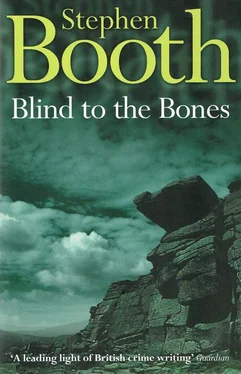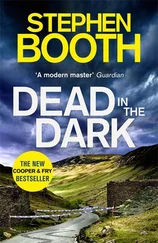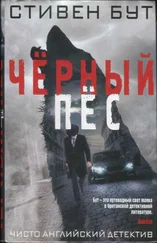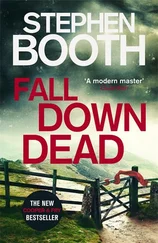In those days, there had been particular pieces of music that she had used to try to lift her mood, and others she had chosen because they matched her depression, or because their words allowed her to wallow in tearful self-pity. Now, they all meant the same thing. They all recalled the bedroom and the diary, the painful recording of the details of her life, the failure of a miracle to happen.
Fry stood for few moments longer, looking at the window of the front bedroom. Then, beginning to get embarrassed, she turned away.
Murfin was waiting for her by the car, smiling contentedly. Food always made him happy. Fry could get envious of him, if she spent too much time in his company.
‘We can cut through this next street, Gavin,’ she said.
‘OK.’
They passed Warley Water Tower, so like a medieval fortress from a distance that it had fuelled her fantasies as a child. And beyond the golf club were Warley Woods. The woods seemed to mark the southern boundary of her territory, with Wolverhampton Road at the western edge, providing the escape route into town. The woods looked neater and more well trained now, less threatening in their orderliness, but also less like a place that might offer a refuge when you needed one.
In a short time, the place had changed a lot. Yet Fry knew she would have difficulty putting her finger on what exactly it was that had changed, what the subtle differences were that made this place so alien from the world she had known as a teenager.
She was glad she’d come, though. Warley was the physical link to her past, and seeing it had helped her to put it into perspective. Finding that the house on the Hilltop estate was nothing like it had been fifteen years ago gave her the power to sever the link in her memory. The bedroom and the diary couldn’t exist behind that stone cladding and the leaded windows. The music had faded with the sight of the little white fence.
And now, maybe, she could put the whole of her past to rest.
Murfin had stopped the car at a crossroads, where there were long rows of shops running to right and left.
‘This is Bearwood,’ said Fry. ‘Where Emma Renshaw went missing, too.’
It turned out that the search of Neil Granger’s house had recovered the box. It had been logged by the exhibits officer, but its existence was buried in a mass of paperwork. It was even smaller than Neil’s brother had recollected — about four inches long and three inches wide, and it was made of brass, not bronze.
‘It looks Indian,’ said Ben Cooper.
‘Expert, are you?’
‘No, sir.’
‘You won’t mind if we get a second opinion then?’
Cooper could see that the DI was irritated to have had to wait for a member of the public to point out the box. It was the only item that resembled an antique in Neil Granger’s house, and now he would have to explain to Mr Kessen why it had only just turned up.
‘Fingerprints?’ said Cooper.
Hitchens sighed. ‘Two recent sets. Neil Granger’s and his brother’s. We took the brother’s prints for elimination when we knew he’d been in the house.’
‘He must have touched it when he noticed it on Saturday.’
‘Check with him anyway.’
‘I don’t suppose there’s anything in it, sir?’
‘Not a thing,’ said Hitchens. ‘It would have been nice, wouldn’t it?’
He passed the bag containing the box to Cooper. ‘See what you can do with it, then. Origin, value — ownership, if you can.’
‘OK.’
‘That’ll take you a while, I expect. What else were you supposed to be working on?’
‘Withens,’ said Cooper. ‘The Oxleys.’
‘Ah well, you’ll probably get round to them later this afternoon. I don’t suppose they’ll miss you.’
‘I think I’m the highlight of their day, sir,’ said Cooper.
After several fruitless phone calls trying to establish the ownership of a brass box that everyone agreed might or might not be Indian, Ben Cooper finally tracked down a dealer in Crookes who offered to take a closer look at the box. Crookes was on the western outskirts of Sheffield, and could be reached via the A628. It was too tempting to resist. He made an appointment that allowed him plenty of time to take another quick look at Withens on the way.
It was nearly four o’clock by the time Cooper reached the village. He saw straight away that the postman came late in Withens. It was probably the last place he reached on his delivery round from Sheffield, or wherever the nearest sorting office was. A distinctive red van was parked outside the Quiet Shepherd, and Cooper walked over to wait for the postman to come out. The postie was in his thirties, fair-haired and blue-eyed, and wearing a navy blue Royal Mail body-warmer. He agreed he was nearing the end of his round, and seemed quite happy to spend a couple of minutes talking about his customers in Withens.
‘They’re a mixed bunch here,’ he said. ‘Take the folk at Waterloo Terrace, the Oxleys. They don’t seem to want their letters at all. At number 1, they nailed the letter box up once. I had to report it, back at the office, and the manager spoke to them. But you’d be surprised at the attitude some people have. I mean, it’s not my fault if they don’t like the mail they get, is it?’
‘No.’
But there’s the lady at the opposite end. Mrs Wallwin, number 7. She hardly gets anything. Sometimes, I collect together a few bits of junk mail and stuff that’s been sent to other people, and I put it through her door, just so that she’s got something to open now and then.’
‘You do?’
Cooper remembered the envelopes he had seen on Mrs Wallwin’s table. ‘You’re a winner!’ ‘Open now for some wonderful news!’ He had assumed Mrs Wallwin used them for lighting her fire, like everybody else. But perhaps she kept them as a sign that somebody out there was thinking about her. Did she realize it was only the postman?
The postman seemed to misread Cooper’s expression as disapproval. ‘Of course, I know I shouldn’t do that, really. I’d probably get the sack if some busybody shopped me for it. But it’s doing no harm. It’s only stuff nobody else wants, isn’t it?’
‘You’re not kidding. I’d pay you not to deliver my junk mail,’ said Cooper.
Since he’d moved into his flat three months before, he’d been gathering mail addressed to every previous tenant. Some of them had been dead for years, according to Mrs Shelley. And some of them had strange tastes in mail-order items, too.
The postman was reassured. ‘The other lot who can be a bit of a nuisance are the Old Rectory folk. Name of Renshaw.’
‘Oh?’
‘They hang around at the gate waiting for me to get there. I think they must be at the upstairs window watching for me coming down the hill, because by the time I get to them they’re jumping up and down with impatience and snapping at me for being late. Which I never am, I might say. I get up here pretty much on time, no matter what the weather’s like in the winter. They don’t seem to appreciate that.’
‘So the Renshaws are eager for their mail?’
‘Aye.’ The postman sniffed. ‘Trouble is, by the way they react, I don’t think I’ve ever brought them what they’re hoping for. I suppose that’s my fault, too.’
‘The Oxleys,’ said Cooper, ‘do you ever have any problems with a dog there? A long-haired Alsatian?’
‘No, I never have a problem,’ said the postman. ‘I know it’s there, all right, but they keep it shut up in the yard. They never let the dog out at the front of the house. Well, not unless they really don’t like the look of you.’
Cooper was surprised to find a Peak Park Ranger in the car park. Of course, the village was within the national park, though it was difficult to remember sometimes. He supposed the area was valued more for its surrounding habitat of peat bogs than for the village itself.
Читать дальше
Конец ознакомительного отрывка
Купить книгу












